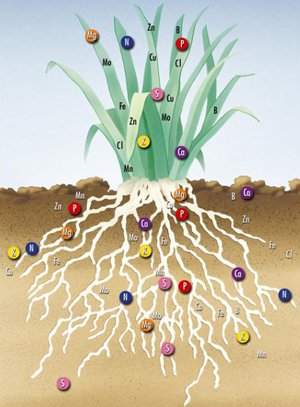FERTILIZER NUTRIENT FUNCTIONS
PRIMARY NUTRIENTS
Nitrogen (N)
- Key element in turfgrass nutrition
- Promotes vigorous leaf and stem growth to improve the overall quality of the turf
- Essential component of the chlorophyll molecule which gives turf its dark green color
- Involved in regulating the uptake of other key elements
Phosphorous (P)
- Used in the formation and transfer of energy within the plant
- Influences early root development and growth
- Encourages plant establishment
Potassium (K)
- Used by the plant in large quantities, second only to nitrogen
- Key component in the formation of carbohydrates, or food for the plant
- Encourages rooting and wear tolerance
- Enhances drought and cold tolerance
- Key component in cell wall strength and resistance to disease
SECONDARY NUTRIENTS
Calcium (Ca)
- Strongly influences proper soil pH
- Essential to strong cell wall structure and cell division
- Can imporve soil structure, water retention and infiltration
Magnesuim (Mg)
- Plays an important role in photosynthesis and chlorophyll production
- A necessary component in many essential enzyme systems within the plant
- Important in aiding the translocation of phosphorous
Sulfur (S)
- Works with nitrogen to produce new protein for plant growth
- Plays an important role in the utilization of oxygen by the plant
- Influences the level of activity of soil microorganisms
MICRONUTRIENTS
Iron (Fe)
- Necessary for the formation of the chlorophyll
- Iron deficiencies are most common in wet, cold, or high pH soils
- Aids in the activation of a number of biochemical processes within the plant
Manganese (Mn)
- Important to the formation of chlorophyll and the activation of the initial growth process
- Generally available in sufficient quantities in the soil
Zinc (Zn)
- Necessary for the production of chlorophyll
Copper (Cu)
- Important in the synthesis of certain plant growth substances
- Serves as an activator for several essential enzymes
- Needed only in small quantites; large amounts can be toxic to turfgrass plants
- Deficiencies are usually only found in highly alkaline (high pH) organic soils or heavily leeched soils
Chlorine (Cl)
- Although essential for proper plant function, only small quantities are required
- May help in the regulation of osmotic pressure within the plant cell
- Deficiency is rarely observed

